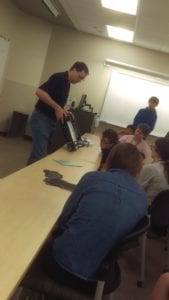Educating the Next Generation: Satori Summer Camp 2019
Tags: Satori Summer Camp
One of the rewarding things about working in the fuel cell industry is getting the opportunity to educate today’s youth about fuel cell and hydrogen technology, and its place in our rapidly changing society. Plug Power takes advantage of opportunities to impact the next generation whenever we can, and one of the many wonderful programs we’ve been involved with for several years now is Satori Summer Camp.
Satori Summer Camp is a week-long enrichment program for gifted youth grades 7 to 12, hosted on the campus of Eastern Washington University, near our facility in Spokane, Washington. The academic summer camp, which simulates a mini-college experience for the students, has been held every year since 1983, during the last week of July. Course offerings cover topics both in the hard sciences, like fuel cells and genetics, as well as the social sciences, such as government, psychology, and even self-care. Campers are selected for the program through an application process, and then sign up for three courses, which they take each day during the week.
Dave Lott, Plug Power’s senior scientist, recently completed his fifth year of teaching at Satori Summer Camp, having been introduced to the program by his wife, a counselor, instructor, and Satori alumna. While Dave’s day job involves working with Plug Power’s core technology, including fuel cell stacks for both our material handling and stationary power products, his involvement with Satori Camp allows him to influence the younger generation to consider the importance of alternative energy in our collective future.
We recently had the chance to check in with Dave and get his take on Satori Summer Camp, fuel cells and the process of enlightenment.
What kind of topics have you covered in your class over the years?
The basic topics I talk about don’t vary much year to year. Topics include why alternative energy and fuel cells are important and how they work. I go over notes from the previous year and if there were questions that the students asked, I incorporate those into the following year’s discussion.
I talk about industry statistics in terms of how many fuel cells and fueling stations are out there. I try to keep things interesting, and l try to spin a different story every time I teach the class, in case there are students who come back. I had one student who came three years in a row!
This year’s topic was “Can fuel cells save the planet?” One of the previous titles was “A day in the life of a fuel cell scientist”. So, there’s always a bit of a different story and different presentation if there are repeat students.
How do you keep the students engaged for a whole week?
All of the classes are about 2 hours in duration each day during the week. I try to give the students a background in why renewable and alternative energy sources are important. I show them what does not work, what does work, and how renewable sources are a better alternative option, in many cases, than traditional power.
I spend a lot of time talking about fuel cells. I teach the basic chemistry and engineering of fuel cell design, and the specific markets that fuel cells work well for and why. It is not a sales pitch, but is designed to teach the students about fuel cells from an educational standpoint. Kids can start to think about it in larger terms, such as what makes a good product and why we spend time doing what we do.
I bring in a small fuel cell demonstration kit that shows the basic operation of a fuel cell (it is older than the students and still works great). It demonstrates the simplicity of the fuel cell. The last few years, I have brought in some of the fuel cell parts used to make the stack, and I have the kids assemble small test cells. We will run them back at the office and update the students on how their cells are doing. The hope here is that by doing something hands-on—something tactile—they’ll better understand the coolness factor of fuel cells. I also bring in small portable instruments that are interesting, including thermal imaging cameras and laser thermometers and expose the students to the different technology and tools we use.
What do you enjoy about teaching at camp?
It always surprises me how enjoyable it is to have a dialogue with these bright young kids, who are very passionate about what they’re learning. It’s really rewarding when they ask a question right before I’m about to cover that topic. It gives me an indication that the students are very engaged and interested in the topic of renewables. That’s really cool to see.
What kinds of feedback have you gotten from the kids after the class?
Over the years, I have had a lot of kids come up after the class, or at one point during the week, and express, “Wow, I didn’t think about these things in this way and it really makes me motivated to have some activity in alternative energy or science.” That’s the whole point—to get them excited about this field.
#InfiniteDrive
